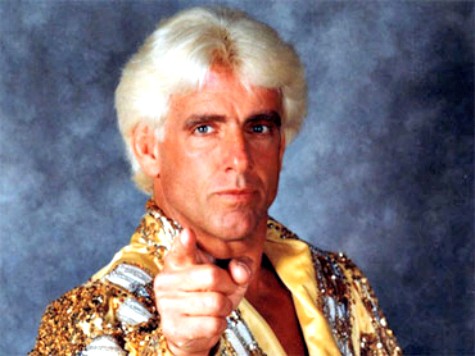In 1995, wrestling legend and GOP supporter Ric Flair, contemplating a trip to North Korea, called good friends Senators Strom Thurmond and Jesse Helms and both offered the same advice: “Don’t Go.” The allure, however, to headline “a spectacular one time global event” with Muhammad Ali helped to ease any apprehension. The stage was set and for five days. Flair was a passport missing, Rolex wearing, Private North Korean jet flying, son of a gun heading for a “Collision in Korea.”
Interviewed recently by Charlotte’s WCNC-12, “The Nature Boy” recalled his 1995 trip and what he experienced while on an extended stay deep behind the Bamboo Curtain.
“It’s a very volatile place,” and “it’s almost like solitary confinement,” Flair said.
At the time, Flair was wrestling for Ted Turner’s World Class Championship Wrestling (WCW) and the United States and North Korea were seven months into the Agreed Framework, which had been “brokered” by Jimmy Carter and signed by President Bill Clinton, seeking to freeze North Korea’s nuclear capabilities.
In the WCNC-12 interview, Flair said his adventure started when Turner, who founded CNN and at the time was married to Jane Fonda, called and pitched a “peace games” concept. With professional wrestling the brand ambassador and Muhammad Ali the sweetener, Turner “fixed it all up” and the result was the ironically named “Collision in Korea.”
The two day international wrestling event took place in Pyongang’s May Day stadium and drew an estimated record setting crowd of 320,000.
But while Dennis Rodman on his recent visit to North Korea was eager to “hug it out” with the brown bear, Flair, more mindful of the political realities, was careful not to poke it.
In his 2004 autobiography To Be the Man, Flair discussed his initial entry into Kim Jung Il’s communist world:
“The second that we arrived in Pyongyang, our passports were confiscated. Then each of us was assigned a ‘cultural attache’ to follow us everywhere; these guys even sat in the dressing room while we went over our matches. In the dining room where the wrestlers ate, there was a camera in each corner, monitoring every movement.”
And what happens when “The Greatest of All Time” in boxing, Muhammad Ali, and “The Greatest of All Time” in wrestling, Ric Flair, try their hands at international diplomacy? As Flair recounts in his book:
“…We were sitting at a big, round table with a group of North Korean luminaries when one of the guys started rambling on about the moral superiority of North Korea, and how they could take out the United States or Japan any time they wanted. Suddenly, Ali piped up, as clear as a bell, ‘No wonder we hate these m*****f*****.’ My hair practically stood up on my head. ‘Oh s**t,’ I whispered, ‘don’t start talking now.'”
What’s more, Flair mentions in the interview that the two took a trip in a North Korean private jet. Given Flair’s longtime support for conservatives, like presidential hopeful Mike Huckabee, the idea of The Nature Boy “stylin and profilin” in communist North Korea is hard to imagine.
Reached by email, longtime pro wrestling columnist for The Post and Courier in Charleston, S.C., and New York Times bestselling author Mike Mooneyham wrote:
“It’s pretty difficult to even mention the names Ric Flair and Kim Jong Il in the same sentence. There have been some unlikely combinations in pro wrestling, but that wouldn’t be one of them. I could have more likely envisioned the Nature Boy putting his figure four on the North Korean dictator … should have challenged him to a loser leaves town match inside a steel cage. Oh, that’s right, North Korea is inside a steel cage.”
As Mooneyham suggests, North Korea is not and never has been “Flair Country.” When Flair was asked to promote professional wrestling on an international stage, he agreed. But when he was asked to promote North Korean propaganda, he refused.
InTo Be the Man, Flair recalls a final scene from the tarmac:
“Before we left North Korea, our handlers requested that I make a speech at the airport. They even had specific points that they expected me to articulate–things like North Korea being a workers’ paradise, and that America sucked.” Flair was resolute in his refusal: “…’I can’t say this.’ The last I wanted was to be quoted in the American press making statements that I didn’t mean.”
Now eighteen years later, how does the Nature Boy describe how he felt after leaving North Korea? Like a backhand chop followed by a loud “Wooooo!” he was quick to respond and in four words stated simply: “Wheels up, Very Happy.”

COMMENTS
Please let us know if you're having issues with commenting.